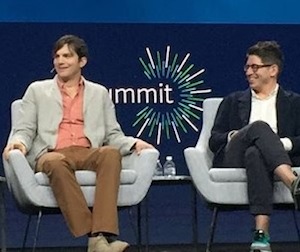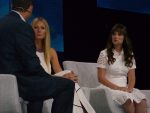Gwyneth Paltrow, left, and Zooey Deschanel at the Sage Summit in July. (photo by Dave Gordon)
Some 15,000 entrepreneurs gathered in Chicago July 26-29 for the Sage Summit, to hear keynote speakers, network and browse the exhibitors’ stations, which spanned the length of 10 football fields, according to Sage chief executive officer Stephen Kelly, who oversees the accounting software giant.
Celebrity speakers included entrepreneurs and actors Gwyneth Paltrow, Zooey Deschanel and Ashton Kutcher, all of whom have Jewish connections.
Paltrow, most known lately for her role as Pepper Potts in the Iron Man film series, was also the head of Goop, which touts itself as a “weekly lifestyle publication.” (She left the publication days after the Summit.)

“The more you create a vision of where you’re going, the more you can create a vertical. Where do you want it to be, where do you imagine it to be, and ask people ‘where do you want it to go?’ – that’s how you form an execution strategy,” she advised entrepreneurs at the Chicago gathering.
She also offered a morale boost for budding entrepreneurs.
“Unwavering self-belief is everything. Everyone’s going to tell you why you can’t do it, and you have to know in your bones that you can do it … and take disappointments with as much grace as you can,” said the actress, whose late father, film director Bruce Paltrow, was Jewish.
Paltrow’s co-panelist, Deschanel of television’s New Girl, is founder of the website Hello Giggles, an online magazine for young women launched five years ago and acquired by Time Inc. in 2015. She has also invested in a hydroponics company that grows sustainable and eco-friendly organic food.
“Trust your gut and be yourself – and watch your bottom line. Customers will thank you for that,” said Deschanel, who converted to Judaism last November.
Chiming in about knowing one’s limits – and about social media engagement – was Kutcher, who has invested in high-tech ventures including Skype, FourSquare and Airbnb.
“I learned by sitting in the rooms being the dumbest person in there and asking a lot of questions,” he said.
Kutcher last year married Jewish actress Mila Kunis. He has been a student of kabbalah and has visited Israel several times.
“I was aggressively into social media early on,” he said at the summit. “From a business perspective, I think it’s valuable from a customer service, customer relations perspective. Building a social media environment for their feedback in a dramatic and visible way creates transparency and delivers a high-quality product and service. From a marketing perspective, if used right, it can be beneficial.”
But, he noted, there’s a critical caveat regarding marketers.

“They come up with these elaborate social media marketing plans, which inevitably fail along the way,” he said, “because marketers tend to forget it’s a conversation, and they don’t account for feedback.”
Kutcher cautioned against having fingers in several social media platforms, noting it’s more about quality than quantity.
“I feel a lot of people aggressively chase the latest in social media marketing and waste a lot of time in it. It’s this sort of race to be on the cutting edge, but, in another sense, it’s time on inefficient platforms. It’s like in acting – the fans don’t go to the actor, the actor should go to where the fans are.”
Twitter, Instagram and Facebook already have “huge swaths of people and have really great tools for targeting,” he added.
Co-panelist Yancey Strickler, one of the three founders of Kickstarter, which he described as “the world’s largest funding platform for creative projects,” has also been the crowdfunding site’s CEO for the past three years.
Despite Kickstarter’s online base, Strickler had his own warning about social media.
“I think social media is bad for our brains, and it’s hard to have introspection on these platforms.… I wouldn’t doubt, in 20 years, if they found what social media does to our brains is what smoking does to our lungs.”
“I’m worried about my brain now,” Kutcher retorted.
Dave Gordon is a Toronto-based freelance writer whose work has appeared in more than a hundred publications around the world. He is the managing editor of landmarkreport.com.

